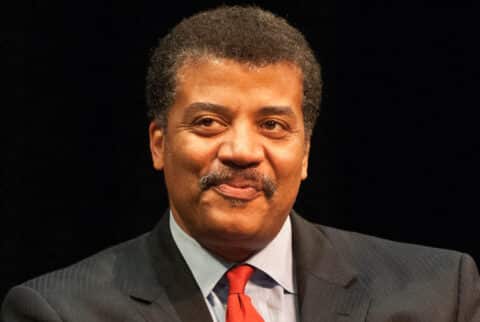Unpacking Neil DeGrasse Tyson's IQ: More Than Just A Number
In the vast cosmos of science communication, few stars shine as brightly as Neil deGrasse Tyson. An acclaimed astrophysicist, prolific author, and captivating television host, Tyson has become a household name, synonymous with making complex scientific concepts accessible and exciting for millions. His distinctive voice, boundless enthusiasm, and profound understanding of the universe have cemented his status as one of the most widely recognized science communicators of our time.
Given his intellectual prowess and remarkable achievements, it's natural for curious minds to wonder about the specifics of his intelligence. A common question that surfaces in online discussions and fan forums is: "What is Neil deGrasse Tyson's IQ?" While the human intellect is far too multifaceted to be encapsulated by a single numerical score, the fascination with IQ remains. In this article, we'll delve into the available information regarding Neil deGrasse Tyson's estimated IQ, explore his extraordinary background and accomplishments, and discuss why, for a mind like his, a number might just be the least interesting part of the story.
The Man Behind the Numbers: Who is Neil deGrasse Tyson?
Before we dive into the specifics of intelligence scores, let's take a moment to appreciate the individual at the heart of this discussion. Born on October 5, 1958, in New York City, Neil deGrasse Tyson developed a profound love for astronomy from a very young age. This early passion blossomed into a stellar career that has seen him become much more than just an astrophysicist; he's a true science rockstar who has been changing the way we think about the universe for decades.
Tyson's career is marked by significant roles and contributions. He is the director of the Hayden Planetarium in New York City, a position from which he continues to inspire countless individuals to look up at the night sky with renewed wonder. His influence extends far beyond the planetarium walls through his numerous books, television appearances, and social media presence. He is a rare hybrid of astrophysicist and popular science communicator, capable of translating the most intricate cosmic phenomena into understandable and engaging narratives.
His success is also reflected in his financial standing. While some sources report his net worth around $5 million, others claim it to be as high as $16 million US dollars. As the director of the Hayden Planetarium, Tyson earns a substantial annual salary, reportedly around $450,000. Furthermore, he recently secured a deal worth $10 million with Netflix to create a series of documentaries, further solidifying his role as a leading figure in educational entertainment. These figures, while not directly related to IQ, certainly underscore his immense impact and success in his field, which requires a blend of profound knowledge, communication skills, and strategic thinking.
The Elusive IQ Score: What the Data Suggests
The question of Neil deGrasse Tyson's IQ is one that frequently pops up, leading to various discussions and claims across the internet. It's important to approach these figures with a critical eye, as his true score is not officially known, and many reports are based on unverified sources.
- Web Series Video Download
- Indian Viral Mms Video
- Telugu Movies Download 2025
- Movierulz Today
- Vegamovies St
The Reported Figure: 123
The most commonly cited IQ score for Neil deGrasse Tyson is 123. This figure appears in numerous online discussions and articles, often presented as an estimated IQ. While these reports are largely unverified, "qualified observers" are said to peg his IQ around 123 based on his extensive writings, numerous media appearances, and impressive background. An IQ of 123 places an individual in the "very superior categorization," meaning it exceeds roughly 94% of test takers. This is undeniably an impressive score, indicating a high level of cognitive ability.
However, it's crucial to reiterate that this specific number remains largely unverified. The web page claims that Tyson's IQ is around 123 based on unverified reports, but his true score is unknown. This lack of official confirmation means that while 123 is the widely circulated estimate, it should be taken with a grain of salt.
An Evolving Mind: IQ Over Time
Interestingly, some sources suggest that Tyson's IQ wasn't static but rather improved as he aged. This fascinating tidbit challenges the common perception that IQ is a fixed measure. According to these reports:
- When Neil deGrasse Tyson was in school, his estimated IQ level was 115, which is already quite good for that age.
- By the time he reached 30 years old, his estimated IQ level had reportedly increased to 120.
- The current estimated IQ of 123 suggests a continued upward trend in his cognitive abilities or, at the very least, his ability to perform on such tests.
This progression highlights the idea that intelligence can be dynamic, influenced by continuous learning, experience, and intellectual engagement, all of which Tyson has in abundance throughout his life and career.
Beyond the Score: A Look at Tyson's Intellectual Prowess
While an estimated IQ score provides a numerical benchmark, it barely scratches the surface of Neil deGrasse Tyson's profound intellectual strengths and achievements. His intelligence is best understood through his extensive education, his remarkable career, and his unique ability to communicate complex ideas.
Education and Academic Journey
Tyson's academic journey is a testament to his dedication and intellectual curiosity. His love of science, especially space, grew significantly during his secondary education. From 1972 to 1976, he attended the prestigious Bronx High School of Science in New York City, a highly competitive institution known for nurturing future leaders in STEM fields. His foundational schooling in New York City laid the groundwork for an illustrious academic career.
He went on to study at some of the world's most renowned universities:
- Harvard University: Where he earned his Bachelor of Arts degree in Physics.
- University of Texas at Austin: Where he received his Master of Arts in Astronomy.
- Columbia University: Where he completed his Ph.D. in Astrophysics.
Following his doctoral studies, from 1991 to 1994, he was a postdoctoral research associate at Princeton University. This rigorous academic background, spanning multiple elite institutions, undeniably had a profound impact on his intellectual development and contributed to his high level of expertise. His education certainly affected Neil deGrasse Tyson's IQ, shaping his mind and expanding his knowledge base in extraordinary ways.
Accomplishments and Contributions
Tyson's intelligence is most evident in his vast accomplishments and contributions to science and public understanding. He is not just a researcher; he is a communicator of unparalleled skill. His ability to explain the intricacies of astrophysics in a way that resonates with a general audience is a rare gift. He has authored numerous books, including bestsellers like "Astrophysics for People in a Hurry," and hosted popular television series such as "Cosmos: A Spacetime Odyssey" and "StarTalk."
His role as a "mouthpiece for academia" highlights his capacity to bridge the gap between cutting-edge scientific research and the public. He embodies the intellectual strengths that make him a rare hybrid of astrophysicist and popular science communicator. His work has inspired countless individuals, fostering a greater appreciation for science and critical thinking. His achievements, ranging from directing a major planetarium to securing multi-million dollar deals for documentaries, speak volumes about his multifaceted intelligence, including his strategic thinking, leadership, and entrepreneurial spirit, which IQ tests typically do not measure.
The IQ Test Debate: Tyson's Perspective and Broader Implications
While the public remains fascinated by IQ scores, the scientific and academic communities often hold a more nuanced, and sometimes critical, view of these tests. Neil deGrasse Tyson himself has contributed to this discussion, offering his own perspective on the limitations of IQ tests.
Neil deGrasse Tyson on IQ Tests
Perhaps one of the most insightful perspectives on Neil deGrasse Tyson's IQ comes from the man himself. In an interview on Sway's Universe, Tyson famously explained that "An IQ test isn't really an IQ test." This statement suggests that he views IQ tests as imperfect measures of true intelligence, implying that they might not capture the full spectrum of human cognitive abilities, creativity, or practical wisdom.
His own experiences and achievements certainly support this view. While an IQ of 123 is high, some might argue it's "lower than expected for his level of expertise and achievements." This perceived discrepancy highlights the argument that IQ is not a good measure of success or intelligence, especially when considering someone with Tyson's extraordinary impact and depth of knowledge. His success is not merely about raw processing power but about his unique ability to connect, inspire, and simplify.
The Academic Stance on IQ Tests
Tyson's perspective aligns with a broader sentiment within academia, which is often "very against IQ tests." The reasons for this opposition are complex. One major argument is that IQ tests, while potentially indicating an individual's capacity to be trained for certain jobs, do not encompass the full range of skills, creativity, emotional intelligence, or perseverance that contribute to real-world success. Academia has historically fought to make it illegal to use IQ tests as part of a hiring process for any job, advocating for more holistic assessment methods.
This debate reflects a fundamental disagreement: some argue that IQ is not a good measure of success or intelligence, emphasizing that real-world accomplishments stem from a combination of factors beyond a single score. Others, however, defend the value of high IQ scores as indicators of intellectual potential. Neil deGrasse Tyson's career serves as a powerful example in this discussion, demonstrating that while he possesses a high estimated IQ, his true brilliance lies in his ability to apply his knowledge, communicate effectively, and inspire a global audience – qualities that transcend any standardized test score.
Conclusion
The question of "What is Neil deGrasse Tyson's IQ?" leads us down a fascinating path, revealing not just a number but a deeper understanding of intelligence itself. While the most commonly reported estimate for his IQ is 123, placing him in the "very superior" category, it's crucial to remember that this figure is based on unverified reports and should be viewed with a degree of skepticism. His true score remains officially unknown, and even Tyson himself suggests that "an IQ test isn't really an IQ test."
What is undeniable, however, is Neil deGrasse Tyson's extraordinary intellect, evidenced by his remarkable educational journey through Harvard, the University of Texas at Austin, and Columbia University, culminating in a Ph.D. in Astrophysics. His career as the director of the Hayden Planetarium, a prolific author, and a captivating science communicator showcases a rare blend of profound scientific knowledge and unparalleled communication skills. He is a "science rockstar" who has truly changed the way we think about the universe.
Ultimately, while the estimated IQ of 123 is an interesting data point, it pales in comparison to the tangible impact and intellectual contributions Neil deGrasse Tyson has made to science and society. His intelligence is best measured not by a single numerical score, but by his ability to inspire wonder, demystify the cosmos, and engage millions in the grand adventure of scientific discovery. He is a testament to the idea that true intelligence is about much more than just a number; it's about what you do with your mind to enlighten and enrich the world around you.
What Is Neil DeGrasse Tyson's IQ? - ExpertBeacon

Neil deGrasse Tyson's IQ - Celebrities IQ

Neil deGrasse Tyson IQ Score | IQ Test Prep